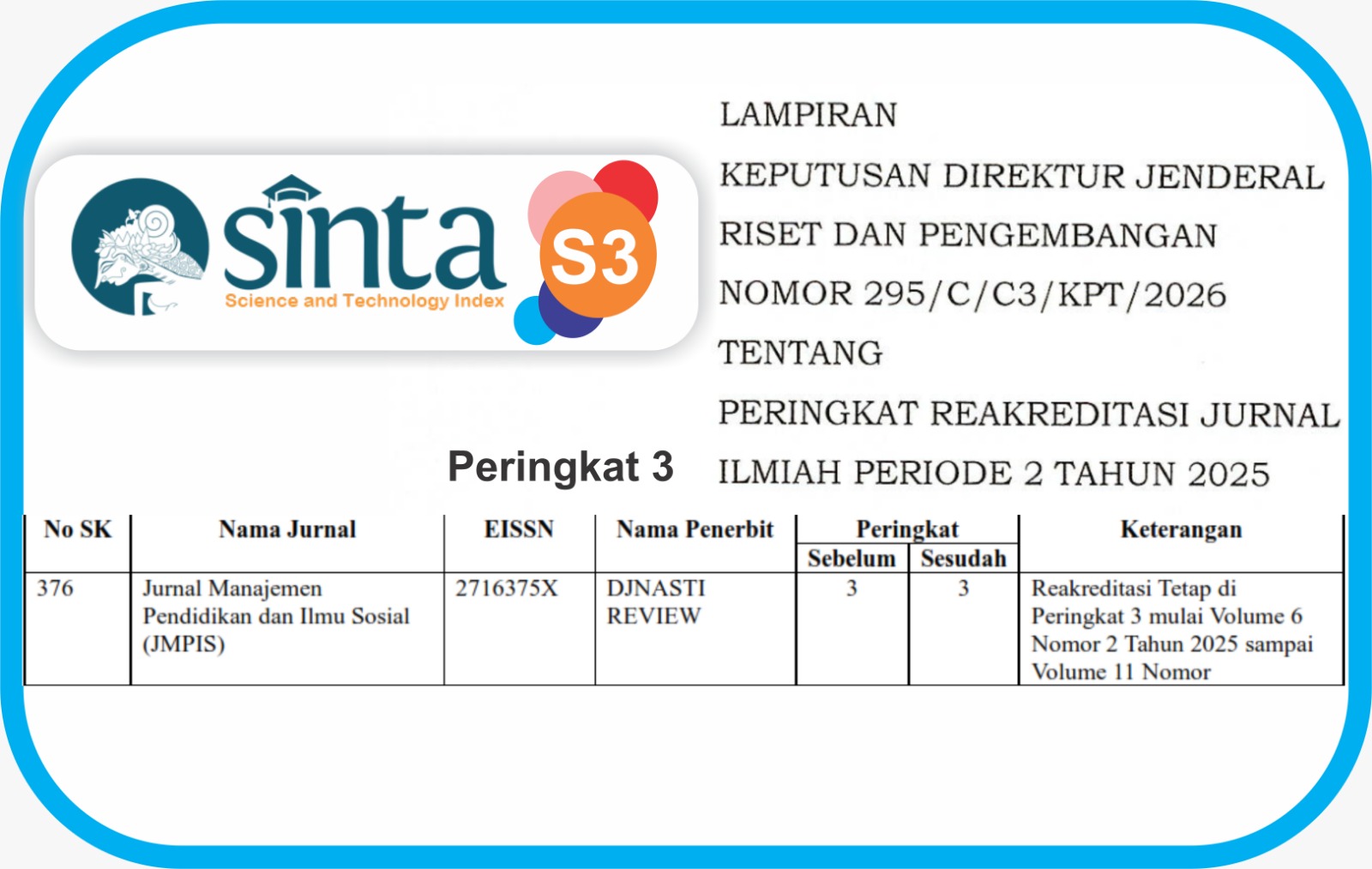Pengaruh Model Problem Based Learning Berbantuan Video Animasi terhadap Keterampilan Pemecahan Masalah IPA ditinjau dari Gaya Kognitif Peserta Didik di Sekolah Dasar
DOI:
https://doi.org/10.38035/jmpis.v6i2.4056Keywords:
Keterampilan Pemecahan Masalah IPA, PBL Berbantuan Video Animasi, Gaya KognitifAbstract
Penelitian ini bertujuan untuk mengetahui pengaruh model PBL berbantuan video animasi terhadap keterampilan pemecahan masalah IPA ditinjau dari gaya kognitif peserta didik. Metode penelitian yang digunakan yaitu metode eksperimen dengan desain treatment by level 2x2. Pengumpulan data menggunakan tes uraian keterampilan pemecahan masalah IPA dan instrumen GEFT. Hasil penelitian, yaitu: (1) keterampilan pemecahan masalah IPA peserta didik yang belajar menggunakan model PBL berbantuan video animasi memiliki rerata skor 71 lebih tinggi daripada peserta didik yang belajar menggunakan model ekspositori berbantuan video animasi; (2) tidak terdapat pengaruh interaksi antara model pembelajaran dan gaya kognitif terhadap keterampilan pemecahan masalah IPA peserta didik; (3) keterampilan pemecahan masalah IPA peserta didik dengan gaya kognitif FI yang menggunakan model PBL berbantuan video animasi memiliki rerata skor 84 lebih tinggi daripada peserta didik yang belajar menggunakan model ekspositori berbantuan video animasi; (4) keterampilan pemecahan masalah IPA peserta didik dengan gaya kognitif FD yang menggunakan model PBL berbantuan video animasi memiliki rerata skor 68 lebih rendah daripada peserta didik yang belajar menggunakan model ekspositori berbantuan video animasi. Berdasarkan hasil penelitian dapat disimpulkan bahwa terdapat pengaruh model PBL berbantuan video animasi terhadap keterampilan pemecahan masalah IPA peserta didik. Kemudian gaya kognitif juga memiliki pengaruh terhadap keterampilan pemecahan masalah IPA peserta didik. Tetapi tidak terdapat pengaruh interaksi antara model pembelajaran dan gaya kognitif terhadap keterampilan pemecahan masalah IPA peserta didik.
References
Eleaser, J. (2023). Pengembangan video animasi pembelajaran berbasis Problem Based Learning pada muatan pelajaran IPA kelas V SD Negeri 1 Selat tahun pelajaran 2022/2023. Jurnal Pendidikan dan Pengajaran, 12(1), 1-10. https://repo.undiksha.ac.id/14712/10/1911021012
Fadilla, N., Nurlaela, L., Rijanto, T., Ariyanto, S. R., Rahmah, L., & Huda, S. (2021). Effect of problem-based learning on critical thinking skills. Journal of Physics: Conference Series, 1810(1). https://doi.org/10.1088/1742-6596/1810/1/012060
Fauzia, N. L. U., & Kelana, J. B. (2020). Natural Science Problem Solving in Elementary School Students Using the Project Based Learning (PjBL) Model. Jurnal Ilmiah Sekolah Dasar, 4(4), 596–603.
Kartikasari, A., Roemintoyo, R., & Yamtinah, S. (2018). The Effectiveness of Science Textbook Based on Science Technology Society for Elementary School Level. International Journal of Evaluation and Research in Education (IJERE), 7(2), 127. https://doi.org/10.11591/ijere.v7i2.13022
Koswara, T., Muslim, M., & Sanjaya, Y. (2019). Profile of problem solving ability of junior high school students in science. Journal of Physics: Conference Series, 1157(2), 022041. https://doi.org/10.1088/1742-6596/1157/2/022041
Kurniawan, E., & Sofyan, H. (2020). Application of problem based learning model to improve problem solving ability of student of XI science grade in chemistry. Journal of Physics: Conference Series, 1440(1). https://doi.org/10.1088/1742- 6596/1440/1/012014
Melawati, O., Evendi, E., Halim, A., Yusrizal, Y., & Elisa, E. (2022). Influence of the Use of Student Worksheet Problem-Based to Increase Problem Solving Skills and Learning Outcomes. Jurnal Penelitian Pendidikan IPA, 8(1), 346–355. https://doi.org/10.29303/jppipa.v8i1.1205
Monica, N. C., Madang, K., & Tibrani, M. M. (2020). Model pembelajaran PBL berbantuan video animasi berpengaruh signifikan dalam meningkatkan kemampuan memecahkan masalah dan hasil belajar peserta didik. Jurnal Pendidikan dan Pembelajaran, 12(3), 210-223. https://doi.org/10.12345/jpp.2020.123456
Monsang, P., Srikoon, S., & Wichaino, N. (2021). The effects of problem based learning for enhancing science problem solving skills. Journal of Physics: Conference Series, 1835(1). https://doi.org/10.1088/1742-6596/1835/1/012016
Murtafiah, M., & Amin, N. (2018). Pengaruh gaya kognitif dan gender terhadap kemampuan pemecahan masalah matematika. Jurnal Penelitian dan Pembelajaran Matematika, 11(1). https://doi.org/10.30870/jppm.v11i1.2986
Mustofa, R. F., & Hidayah, Y. R. (2020). The effect of problem-based learning on lateral thinking skills. International Journal of Instruction, 13(1), 463–474. https://doi.org/10.29333/iji.2020.13130a
Nursyahidah, F., Saputro, B. A., & Rubowo, M. R. (2018). Students Problem Solving Ability Based on Realistic Mathematics with Ethnomathematics. In Journal of Research and Advances in Mathematics Education (Vol. 3, Issue 1). http://journals.ums.ac.id/index.php/jramathedu
Rahmah, N., & Aznam, N. (2023). Application of Problem-Based Learning and Scientific Approach to Self-Efficacy and Problem-Solving Ability in Reaction Rate Material. Jurnal Penelitian Pendidikan IPA, 9(1), 378–383 https://doi.org/10.29303/jppipa.v9i1.2576
Rahmatina, Kenedi, A. K., Eliyasni, R., & Fransyaigu, R. (2019). Jigsaw using animation media for elementary school. Journal of Physics: Conference Series, 1424(1). https://doi.org/10.1088/1742-6596/1424/1/012027
Rochman, C., Nasudin, D., & Rokayah, R. (2019). Science literacy on science technology engineering and math (STEM) learning in elementary schools. Journal of Physics: Conference Series, 1318(1). https://doi.org/10.1088/1742- 6596/1318/1/012050
Sahyar, S. S., & Sani, R. (2017a). The Effect of Problem Based Learning (PBL) Model and Self Regulated Learning (SRL) toward Physics Problem Solving Ability (PSA) of Students at Senior High School. American Journal of Educational Research, 5(3), 279–283. https://doi.org/10.12691/education-5-3-8
Sahyar, S. S., & Sani, R. (2017b). The Effect of Problem Based Learning (PBL) Model and Self Regulated Learning (SRL) toward Physics Problem Solving Ability (PSA) of Students at Senior High School. American Journal of Educational Research, 5(3), 279–283. https://doi.org/10.12691/education-5-3-8
Shishigu, A., Hailu, A., & Anibo, Z. (2018). Problem-based learning and conceptual understanding of college female students in physics. Eurasia Journal of Mathematics, Science and Technology Education, 14(1), 145–154. https://doi.org/10.12973/ejmste/78035
Stoeffler, K., Rosen, Y., Bolsinova, M., & von Davier, A. A. (2020a). Gamified performance assessment of collaborative problem solving skills. Computers in Human Behavior, 104. https://doi.org/10.1016/j.chb.2019.05.033
Stoeffler, K., Rosen, Y., Bolsinova, M., & von Davier, A. A. (2020b). Gamified performance assessment of collaborative problem solving skills. Computers in Human Behavior, 104. https://doi.org/10.1016/j.chb.2019.05.033
Suarsana, I. M., Lestari, I. A. P. D., & Mertasari, N. M. S. (2019). The Effect of Online Problem Posing on Students’ Problem-Solving Abilitiy in Mathematics. In International Journal of Instruction (Vol. 12, Issue 1). www.e-iji.net
Suendarti, M. (2017). The Influence of Jigsaw Learning Model on the Ability of Resolution Natural Science of Middle East Junior High School Students Indonesia. INTERNATIONAL JOURNAL OF ENVIRONMENTAL & SCIENCE EDUCATION.
Utami, A. M., & Amaliyah, N. (2022). The effect of blended learning model assisted video animation to the motivation and learning outcomes of science. Jurnal Penelitian Pendidikan IPA, 8(3), 1416–1424. https://doi.org/10.29303/jppipa.v8i3.1675
Valdez, J. E., & Bungihan, M. E. (2019). Problem-based learning approach enhances the problem solving skills in chemistry of high school students. Journal of Technology and Science Education, 9(3), 282–294. https://doi.org/10.3926/JOTSE.631
Downloads
Published
How to Cite
Issue
Section
License
Copyright (c) 2025 Fahira Arsyaf, Agung Purwanto, Tian Abdul Aziz

This work is licensed under a Creative Commons Attribution 4.0 International License.
Hak cipta :
Penulis yang mempublikasikan manuskripnya di jurnal ini menyetujui ketentuan berikut:
- Hak cipta pada setiap artikel adalah milik penulis.
- Penulis mengakui bahwa Jurnal Manajemen Pendidikan dan Ilmu Sosial (JMPIS) berhak menjadi yang pertama menerbitkan dengan lisensi Creative Commons Attribution 4.0 International (Attribution 4.0 International CC BY 4.0) .
- Penulis dapat mengirimkan artikel secara terpisah, mengatur distribusi non-eksklusif manuskrip yang telah diterbitkan dalam jurnal ini ke versi lain (misalnya, dikirim ke repositori institusi penulis, publikasi ke dalam buku, dll.), dengan mengakui bahwa manuskrip telah diterbitkan pertama kali di Jurnal Manajemen Pendidikan dan Ilmu Sosial (JMPIS).











































































